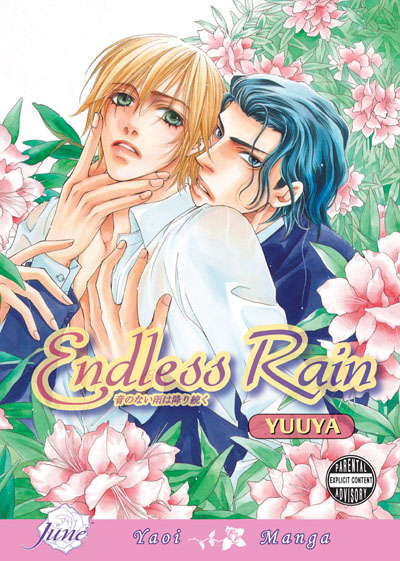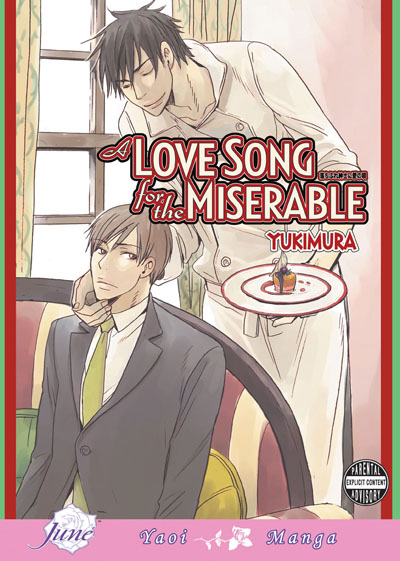



 October 9, 2010
October 9, 2010
Reviewer: Kimi-Chan
Tsukada and Yuuki were living their dream. The lovers had their own place, a tiny café with living quarters nestled at the picturesque foot of Mount Asahidake in Hokkaido, that Yuuki had inherited from his grandparents. Not only did it provide them with an income along with Tsukada's job at a sports equipment store but Tsukada got to indulge in his other passion: mountain climbing. The love birds were living in what seemed like paradise to them, until one fateful day one year ago. While guiding a group of mountain climbers on a tour arranged by his boss, Takai, the worst possible thing happened. A small avalanche buried Tsukada under the snow even as he protected his climbers. Yuuki still has not gotten over his lover's death, and worst still is how haunted he is by the day of Tsukada's death. Yuuki had cheerfully been waiting on customers, with the mountain in full view, while Tsukada lay upon it dying. In fact, he did not even learn of his death until Tsukada's boss managed to contact him, as same sex relationships in Japan have very little legal protection, so when emergency services mobilised and next of kin were informed, it was Tsukada's parents who were told, and who collected the body, refusing Yuuki's status as their son's life partner. Suddenly bereft of the one who gave his life meaning, their five year relationship dismissively trivialised and treated as an unwelcome pariah, Yuuki struggles deeply with his grief and survivor's guilt.
He plods on in his daily life, opening the café, serving customers, and looking at Tsukada's beloved mountain. Former schoolmate Shin comes by everyday to keep him company, and to share a drink, often spending the night. Yuuki can't even drink however, as his depression has him so keyed up that drinking before bed makes his sleep worse, and he can't get a decent night's rest without sleeping pills any more anyway. Into this walks a mysterious, scruffy stranger. He walks into the café, orders one of everything on the menu, and then critiques the food. Yuuki is surprised at the scruffy man's actions, though intrigued. He's tall, athletically built, but walks with a pronounced limp. And then there is the strangely nostalgic ruck sack he carries...it is exactly like the one Tsukada carried. The stranger turns out to be named Kamishiro, and he has come to take the position Yuuki has advertised out front. Yuuki was hiring someone to mind the tables, but this guy turns out to be a five star chef, and he is intending to work in the kitchen. Telling Yuuki that he'll work for the small salary plus room and board, he demonstrates he can cook foods that the locals will be happy to eat. With no reason to say no, Yuuki accepts, to Shin's dismay. There is something about himself Kamishiro is not saying, and when added to the fact that he is a lot like Tsukada, Shin realises this could change things for Yuuki, and not necessarily for the better. Just what secrets is Kamishiro hiding, and what made him come seeking the small café known as Fuuka?
I quite enjoyed the gentle melancholy pace of this tale. A lot of ground actually gets covered in the 200 odd pages, touching on topics such as the rights of gay couples, to how one deals with grief and moves on. With relationships built on mutual attraction, deep affection, and feelings of tenderness, this is one of the few Boy's Love stories that I can see really fits firmly into the romance category. It is quite simply NOT about the sex, though we do get some of that. Instead, Sakuragi delves deeply into the emotional and psychological aspects of love and so hands us a beautiful portrait painted in muted colours. The depiction of the emotional watershed moment for Yuuki is as manic as it should be, and while the lovemaking scene after it is so frenetic as to be almost comical, it strikes a chord with those who have experienced deep loss as to the extremes one can go while dealing with the well of buried emotions that come erupting forth, perhaps inappropriately. Yuuki has trust issues in general, and when you understand how he was dealt with by Tsukada's family the day of his death and afterwards, it is no wonder. Toss in the feelings of abandonment suffered by those who are left behind as part and parcel of their survivor's guilt given circumstances like those, and one fairly wants to weep with compassion for the friends and family left affected by the tragedy one year ago.
The cover alone wanted to make me read this, though I have to admit from the cover one would expect a plethora of steamy romps through the kitchen and bedroom from that image. Which, of course, is NOT what one gets, though once read, the cover is seen from a different perspective, and yet, remains appropriate. The book's illustrations are just as gorgeously rendered by the artist, Katsumi Asanami. They have a feeling of delicacy about them that almost belies the utter realism of the backgrounds and facial expressions. There are not a great many pictures, but what is there adds much to the story and it would be a poorer book without them.
![Caged Slave (Yaoi Novel) [US] Caged Slave (Yaoi Novel) [US]](images_osc/thumbnails/9781569707357.jpg)
![Promise of Romance, A (Yaoi Novel) [US] Promise of Romance, A (Yaoi Novel) [US]](images_osc/thumbnails/9781569707104.jpg)
![Sweet Admiration (Yaoi Novel) [US] Sweet Admiration (Yaoi Novel) [US]](images_osc/thumbnails/9781569707326.jpg)



![Sleeping With Money (Yaoi Novel) [US] Sleeping With Money (Yaoi Novel) [US]](images_osc/thumbnails/9781569707388.jpg)
![Immoral Darkness (Yaoi Novel) [US] Immoral Darkness (Yaoi Novel) [US]](images_osc/thumbnails/9781569707135.jpg)





